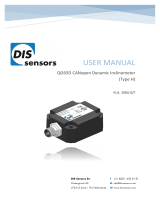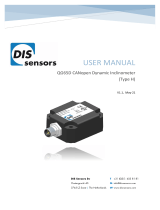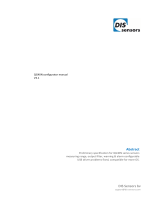Page is loading ...

QG40N Tilt SIL1 PLc
User Safety Manual v1.3
page 1 of 6
1
QG40N Tilt SIL1 PLc Safety Sensor
User Safety Manual
Original instructions
Table of Contents
1 Introduction................................................................................................................................................................. 2
2 Quick Reference Guide ............................................................................................................................................... 2
3 Safety, Installation, use & maintenance ...................................................................................................................... 2
4 Safety level ................................................................................................................................................................. 3
5 Tilt switch sensor explained........................................................................................................................................ 3
6 Acceleration switch sensor explained ......................................................................................................................... 3
7 Safety function ............................................................................................................................................................ 3
8 Hardware setup ........................................................................................................................................................... 4
9 EMC / CE .................................................................................................................................................................. 4
10 Signal processing ........................................................................................................................................................ 4
10.1 Sample rate and averaging ............................................................................................................................... 4
10.2 Output filter: .................................................................................................................................................... 4
10.3 Zeroing ............................................................................................................................................................ 4
10.4 Delay times ...................................................................................................................................................... 5
11 Internal diagnostic tests .............................................................................................................................................. 5
12 Document revision control .......................................................................................................................................... 5
13 Impression................................................................................................................................................................... 6

QG40N Tilt SIL1 PLc
User Safety Manual v1.3
page 2 of 6
2
1 Introduction
This manual is valid for the following safety sensors from DIS-sensors
‘QG40N Tiltswitch SIL1 / PLc’
‘QG40N Acceleration switch SIL1 / PLc’
Family overview:
• One housing type: 40x40mm plastic
• Two different Tilt switch types:
Tiltswitch 1-axis (vertical plane) up to ±170° range, outputs 2x NPN or 2xPNP
Tiltswitch 2-axis (horizontal plane) up to ±80° range, outputs 2x NPN or 2xPNP
(Types available with M12 connector or cable with open ended wires)
Various sensor-settings can be configured in the factory or by the customer using the optional ‘QG40N
configurator’
• Two different Acceleration switch types:
Acceleration switch 2-axis (horizontal plane) up to 8g, outputs 2x NPN or 2xPNP
Acceleration switch 3-axis (omnidirectional) up to 8g, outputs 2x NPN or 2xPNP
(Types available with M12 connector or cable with open ended wires)
Various sensor-settings can be configured in the factory, no ‘QG40N configurator’ support
2 Quick Reference Guide
• Safety level: SIL CL 1 / PLc
• Dual NPN or Dual PNP outputs (200mA continuous, all outputs simultaneously)
• Zeroing adjustment available via separate input
• Tiltswitch: User configurable by optional ‘QG40N configurator’ (switch points, delay-times, filtering)
• Acceleration switch: No QG40N configurator support
• Default bandwidth Tilt switch: 0.7Hz, sample rate g-sensor-chip: 3200Hz.
• Bandwidth Acceleration switch: 1600Hz, sample rate g-sensor-chip: 3200Hz
• Tiltswitch output filter: adjustable low-pass filter 1
st
order. Controlled by QG40N configurator
3 Safety, Installation, use & maintenance
• By ignoring the safety instructions the manufacturer cannot be hold responsible for any damage or hazard.
• If any damage is noticed the device must be replaced by a new one in order to avoid hazard.
• Never move the sensor by pulling the cable.
• The device should only be used in environmental situations covered by the datasheet.
• As this device is accelerometer-based the sensor is inherent sensitive for accelerations/vibrations. Application
specific testing must be carried out to check whether this sensor will fulfil customer requirements.
• The family of sensors involved will have a variety of types. Datasheets are available for each specific type.
Customer must select and read the datasheet for the product he is using.
• The Safety Related Fault Response Time (SRFRT) of this device is defined as the maximum time the sensor will
report a non-safe situation to the outside world, after detecting an internal safety error. The actual value is specified
in the datasheet
• Configuration of the Tilt switch device like changing Set points, filtering etc. can be done with the optional QG40N
configurator. The customer is responsible to only let authorized / trained personnel do this configuration.
The manufacturer is not responsible for these configuration changes.
• The sensor should be mounted on a stable flat surface with at least two screws tightened.
• Customer takes care to only use good quality industrial connectors/cabling to connect the sensor.
• The proof test interval (mission time) for this sensor is 20 year. After this interval the sensor should be replaced or
checked by comparing the output to a reference sensor, or checked / recalibrated by the manufacturer. This is to
check for any non-detectable faults and/or degradation. This check / recalibration is not included in the price.
• The calculated MTTFd of the sensor is specified in the datasheet.
• This sensor does not require any maintenance between proof-test intervals.

QG40N Tilt SIL1 PLc
User Safety Manual v1.3
page 3 of 6
3
The user of this safety device shall only use this device when:
• he is educated to design in / use functional safety sensors.
• he has taken knowledge of both the datasheet, the user manual and the Declaration of Conformity
• the zeroing function and configuration with the QG40N configuration tool is only performed in the right position by
an authorized person. Manufacturer is not responsible for any damage caused by these customer-setting, even when
the manufacturer defaults are used.
• the bandwidth settings (filtering) are set according to the application demand
• the device is used inside the specified environmental situation
The user of this safety device shall consider its output as ‘unsafe’ in the following situations:
• the device output used is non-conducting (non-conducting should lead to ‘low’ thanks to external pull down resistor)
If two outputs are used, the device shall be considered as ‘unsafe’ even if only one output is non conducting.
4 Safety level
SIL safety level: SIL CL1 (claim limit 1 according to IEC 62061)
PL safety level: PLc (according to EN ISO 13849)
Architecture: HFT=0 (according to IEC 62061) & CAT2 (according to EN ISO 13849)
This is a self-certified safety device
The firmware of this device is developed according to EN ISO 13849 and meets the SRESW requirements for both ‘PL a to
d’ and ‘PL c or d’
See separate ‘Declaration of Conformity’ for all safety related parameters
5 Tilt switch sensor explained
An inclinometer measures the angle(s) of the device with respect to earth gravity, using earth gravity vector as external
reference. The inclinometer involved is based on an accelerometer. The acceleration values are used to calculate the angle(s).
The device takes both the static component (100%) and the dynamic component (partial, depending on frequency and
bandwidth-setting) into account.
The Tilt switch sensor realises the switching behaviour for the NPN/PNP outputs based on these inclinometer angles by the
internal microcontroller.
6 Acceleration switch sensor explained
An Acceleration sensor measures the acceleration in 1, 2 or 3 axes. Internally the sensor has a ‘measuring interval’.
The sensor has two modes:
PEAK (default): The peak acceleration value is calculated over the fixed 40ms measuring interval.
RMS (optional): The RMS acceleration value is calculated over a factory programmable measuring interval of n*40ms,
where n=integer, with a max. of 10 seconds.
The acceleration switch sensor realises the switching behaviour for the NPN/PNP outputs based on these accelerations by the
internal microcontroller.
7 Safety function
The safety function of the Tilt switch sensor is to generate the requested switching behaviour based on acceleration values
(caused by gravitation) measured by a MEMS acceleration sensor chip. Based on this switching behaviour (one non-
conducting output = unsafe) the safety controller of the application can switch the machine to safe-mode in order to prevent
for a dangerous situation.
Example: a crane-arm having a maximum tilt angle w.r.t. the chassis. If the tilt angle of the crane-am exceeds a certain
critical value, it can become dangerous. To prevent for this a Tilt switch can be mounted on the crane arm, measuring angle
of the crane arm. The safety controller of the application should monitor the Tilt switch outputs and should switch the crane
to safe-mode as soon as one of the Tilt switch outputs become non-conducting. This will significantly reduce the risk of a
dangerous situation to happen.

QG40N Tilt SIL1 PLc
User Safety Manual v1.3
page 4 of 6
4
8 Hardware setup
Connection:
Default: 5-pins M12 connector male (A-coding). See datasheets for details
Optional: Cable with open ended wires. See datasheets for details
9 EMC / CE
See separate ‘Declaration of Conformity’
10 Signal processing
The signal processing consist of several aspect, addressed below.
10.1 Sample rate and averaging
Tilt switch sensor:
The internal g-sensor chip is sampled every 10ms. Each sample of the element consists of 16 samples for each axis.
Resulting in sample rate of 1600 Hz. These samples are input for a 32 tabs FIR input low pass filter. Each 10ms new data is
available for the µC.
A decimating filter reduces the refresh rate by 4x, so refresh rate is 40ms
This decimating filter is averaging the values during the 40ms refresh rate (4 samples averaging)
Acceleration switch sensor:
The internal g-sensor chip is sampled every 5ms. Each sample of the element consists of 16 samples for each axis. Resulting
in sample rate of 3200 Hz. Each sample is checked over the measuring interval. At the end of the measuring interval the
acceleration value is compared to the programmed switch points and the switching outputs are set accordingly, refresh rate
40ms.
10.2 Output filter:
Tilt switch sensor:
The output of the sensor can be extra filtered by a 1
st
order low-pass filter. Default this output filter is disabled.
Via the optional ‘QG40N configurator’ a -3dB frequency or RC-time can be configured.
A longer low-pass filter time results is a smaller bandwidth and therefore a more stable output signal (less noise), but also
more phase delay.
Acceleration switch sensor:
Not applicable
10.3 Zeroing
To eliminate mechanical offsets a zeroing actions can be performed.
During the 1
st
minute after power up the zeroing input is sensitive for a zeroing action.
Sequence:
1. Left input unconnected during power up for at least 0.5s
2. Switched/connect input to Gnd for at least 0.5s
3. Left unconnected again
4. Result: The sensor will set the current inclination position as 0°. The actual zeroing point is where the input changes
from Gnd to unconnected.
The maximum zeroing-range is specified in the datasheet. Horizontal mounting sensors have zeroing-range-limit of ±5°,
vertical mounting sensor can be zero-ed over full 360°.
The new 0° value will be stored in non-volatile memory (EEPROM)

QG40N Tilt SIL1 PLc
User Safety Manual v1.3
page 5 of 6
5
10.4 Delay times
Each switching output is preprogrammed to have certain on/off delays. See datasheet for details
These delays can be tuned by the customer in case of the tilt switch (optional QG40N configurator)
11 Internal diagnostic tests
To ensure safety the hard- and software of the safety sensor is continue checked to a certain extend (Diagnostic Coverage) .
When a failure is detected both outputs will switch to non-conducting. Non-conducting should lead to ‘low’ thanks to
external pull down resistor. Customer shall consider this situation as ‘unsafe’ and take appropriate actions to bring the
application to ‘safe-state’
12 Document revision control
v0.1 Draft by MvA
v1.0 After review by RM
v1.1 Chapter 4: PLd corrected to PLc
v1.2 20200225 Available measuring ranges updated
v1.3 20200525 Acceleration switch functions added

QG40N Tilt SIL1 PLc Safety Sensor User Safety Manual
V1.5
page 6 of 6
13 Impression
QG40N sensor QG40N configurator hardware, connection M12 (sensor) and USB (PC)
/









